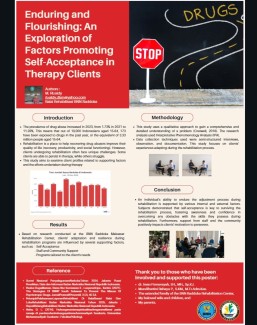Enduring and Flourishing: An Exploration of Factors Promoting Self-Acceptance in Therapy Clients

Substance abuse in Indonesia is on the rise each year. Rehabilitation centers play a crucial role in helping individuals recover from addiction and improve their quality of life (recovery, productivity, and social functioning). However, clients undergoing rehabilitation often face unique challenges. Some clients can successfully adhere to therapy, while others struggle. Therefore, the ability to adapt to various challenges during the rehabilitation process is essential.
This study aims to explore the characteristics of clients, focusing on the supporting factors and efforts made during therapy. The research was conducted at the Baddoka Rehabilitation Center in Makassar, South Sulawesi, which is managed by the National Narcotics Agency (BNN). Semi-structured interviews, observations, and document analysis were used as research methods.
The findings indicate that research subjects have the ability to persist in therapy, influenced by both internal and external factors. The subjects demonstrated that self-acceptance is a key factor in sustaining the therapy process. Self-acceptance serves as a benchmark for behavioral changes experienced by the research subjects, although self-acceptance is not fixed and may vary depending on the challenges faced by the clients. Gaining a better understanding of each problem faced contributes to increased self-acceptance. Additionally, support from staff, the community, and family during therapy has a positive impact on clients.
Keywords: Rehabilitation, Recovery, Therapy, Self-acceptance.